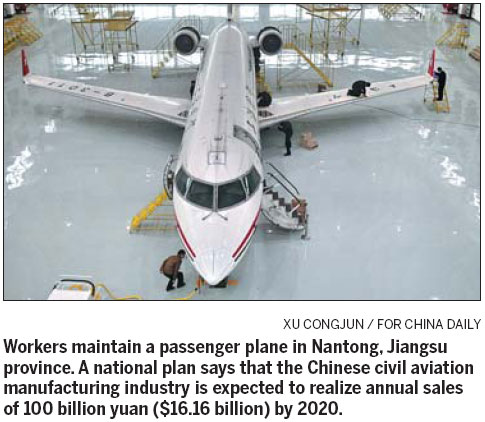Civil aviation plan sets targets for domestic industry

Chinese narrow-body aircraft manufacturers will break the market duopoly of Boeing and Airbus by grabbing at least 5 percent of the domestic market by 2020, according to an industry plan unveiled on Thursday.
Officials at the Ministry of Industry and Information Technology said the plan is the country's first national development outline for the civil aviation manufacturing industry.
The sector is expected to realize annual sales of 100 billion yuan ($16.16 billion) by 2020, according to the blueprint, and a growing number of aircraft being used on general aviation services will be built by domestic companies, it said.
A key component of that plan will be the development of a domestic aero-engine industry, with the country's own large passenger aircraft engine expected to be developed within the next 10 years.
Su Bo, vice-minister of industry and information technology, told Xinhua News Agency that the plan ensures that China's aviation industry will be upgraded, and that its international competitiveness will be strengthened.
Li Xiaojin, a professor at the Civil Aviation University of China in Tianjin, added: "That market share target is very achievable as China continues to invest in its aircraft manufacturing project," referring to the country's flagship project, the C919.
The State Council first approved the C919 - the development of a planned family of 168-190 seat narrow-body airliners to be built by the Commercial Aircraft Corporation of China- in 2007, with a promised investment of 60 billion yuan.
Boeing Co, the giant US aircraft manufacturer, has forecast that China will have more than 2,200 commercial aircraft by 2020, with the market dominated by single-aisle aircraft.
"Based on the latest data, a 5 percent market share will be no more than 100 aircraft, which is realistic for China-made aircraft," Li added.
By the end of 2012, the C919 already had 380 orders, according to Comac. It is due to make its first flight by the end of 2014 and deliveries should start from 2016.
However, challenges remain to achieve those targets.
"Chinese manufacturers have no experience of building such commercial aircraft and they have to look for new solutions to every problem they meet," said Li, adding they also have to compete with some powerful rivals.
The Boeing 737 and Airbus 320 are seen as the major rivals for the C919, both of which have huge sales and many existing customers.
Some competitors from Canada, Brazil and Russia are very competitive too, Li added.
Besides single-aisle aircraft, twin-aisle aircraft manufacturing has also been written into the government's plan.
"To meet demands for intercontinental flights and flights between international hub airports, China will develop its twin-aisle aircraft at the right time," it added.
The plan said that growth of the civil aviation sector will also lead to the development of many other associated industries, such as aircraft maintenance.
"From that perspective, too, the twin-aisle aircraft project is very meaningful for Chinese industry," added Li.
The new plan highlighted that an assembly line for medium-power turbine engines is expected to be established by 2015, with large engines expected to be rolling off the production line within a decade.
A research project for aircraft engines has already been submitted to the State Council and is expected to be given investment of at least 100 billion yuan, the China Securities Journal reported in December.
International cooperation is further encouraged, according to the plan, as is the subcontracting of some production.
The plan added that Chinese civil aviation enterprises still have much to learn from international manufacturers, especially on technical issues.
The industrialization of regional aircraft and general aviation aircraft is also included in the plan, as is reform of airspace management and the opening of low-altitude airspace.
Private investment is also encouraged.
wangwen@chinadaily.com.cn


















